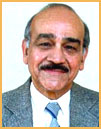|
|
|
|
|
| HOME | NEWS | INTERVIEW | |||
|
February 8, 2001
NEWSLINKS
|
The Rediff Interview/J&K Governor Girish Chandra Saxena   Governor Girish Chandra Saxena, New Delhi's top representative in Jammu and Kashmir, believes that the killing of six Sikhs has not derailed the peace process. He hopes to persuade the minority community to stay back and not migrate en masse. In a rare interview to Assistant Editor Chindu Sreedharan, 'Gary' Saxena takes an overview of the scenario in J&K.
In the wake of the Mehjoor Nagar incident, how would you assess the
situation in the Valley and Jammu?
The situation is difficult, but under control. The responsibility to
protect soft targets scattered all over the Valley and Jammu region is
quite formidable. We do our best. But it cannot be ensured that there
is security cover everywhere for everyone. So I will not underestimate the
challenge we face.
But on the whole, the situation is well contained
and we are keeping things under manageable proportions.
What effect has this had on the peace process? Where do you see it
going now?
It [the killings] is part of the attempt by jihadi
outfits and their mentors across the border to scuttle the peace process. They
are trying to create problems in implementing the suspension of combat
operations, which is generally called cease-fire. There is no
cease-fire as such, but this is what they are up to.
As long as there is no positive response from the other side this
problem will be there. The situation has to be kept under review.
Whatever corrective measures are needed will be applied. But these are
political decisions and will be taken by the political leadership in
consultation with the security forces and the chief minister.
Has the incident set back the peace process?
It is a negative development which does not help the peace process.
This is something that we had to be prepared for. Everything does not change the situation in qualitative
terms.
Yes, it is worrisome. And we take note of it and review the situation
regularly. We share our views with the Centre and then a decision is
taken.
There have been instances of violence against Muslims from Sikhs. Do
you see a communal backlash?
Of course, there is the understandable reaction of resentment and anger,
but communal peace and harmony have always been maintained by the
leaders of all communities. This is a heartening feature and I hope it
will continue.
After Chattisinghpora, the state had promised that Sikhs would be
protected. It has failed in that.
Whenever such an incident takes place it is a kind of failure. But a
proxy war and cross-border terrorism is going on on a massive scale. It
is not possible to prevent incidents from happening altogether.
After Chattisinghpora, a hundred or so places were identified to give
security cover. It is in place. It has been 10 or more months after
that
incident, which has been comparatively incident-free except for the
truckers being killed in Banihal a few days after the prime minister
announced this suspension of combat operations.
We try to prevent [such incidents], but we know that once in a
while the security cover will not prove adequate.
Since there is no such thing as foolproof security for soft targets
in Kashmir, is it justifiable to ask the Sikhs to stay back?
There is a war going on. We are talking of not hundreds, but thousands
of terrorists. They keep infiltrating. It is a challenging
situation. This means that the security arrangements should be
fail-safe all the time. And that is something we can only aspire to have.
It doesn't happen. It doesn't happen anywhere in the world.
Dr Farooq Abdullah feels that under the prevailing circumstances,
with attacks from militants continuing, the cease-fire should be
withdrawn. Do you agree with this view?
No, he hasn't said that -- at least not to me. He has as a matter of
fact endorsed and gone along with the initiative that has been taken by
the Centre. He has been co-operating in full measure. His view is that
if it continues to be unilateral and there's no positive response from
the other side, then he is wondering how it can continue indefinitely.
So personally you would endorse extending the cease-fire?
There will surely come a time for stocktaking. In the meantime, we want
to give the peace process the best chance to succeed. Certain things
had
been expected and taken into account.
The feedback that Kashmiris in Srinagar and also rural areas of
Baramulla district give us is that the cease-fire has absolutely no
meaning for them. Please comment.
The person at the receiving end will have that feeling. We understand
it. But many people have heaved a sigh of relief, especially along the
international border and the Line of Control. In the whole of January
there was no trans-border shelling. So tens of thousands of people have
had a respite.
But in the interiors militants are targeting soft targets in a
selective
way. They are targeting people who are opposed to their movements,
special police officers, surrendered militants and political activists.
They have an element of surprise in choosing their targets. We have to
ensure the security of everyone. But they have to succeed only once,
with one person. That's the problem.
We have a fight on our hands. I don't want to underestimate that. And
we have to see it through.
If the Sikhs insist on migration, how would the administration
handle it? What kind of facilities would they be provided in Jammu?
I don't want to jump the gun and go that far ahead. We will be doing
our best to reason out things with them and persuade them to stay back.
Migration doesn't help them and doesn't help the country's interest. So
there is no clash between their interest and what is at stake for the
state and country as a whole.
Naturally, right now the Sikhs are angry and in a different frame of
mind, but slowly they will see the advantages [of staying
back].
We will talk things over with them.
Design: Lynette Menezes
EARLIER INTERVIEWS:
'At the end of the day the issues have to be decided politically, not militarily'
|
||
|
HOME |
NEWS |
CRICKET |
MONEY |
SPORTS |
MOVIES |
CHAT |
BROADBAND |
TRAVEL ASTROLOGY | NEWSLINKS | BOOK SHOP | MUSIC SHOP | GIFT SHOP | HOTEL BOOKINGS AIR/RAIL | WEDDING | ROMANCE | WEATHER | WOMEN | E-CARDS | SEARCH HOMEPAGES | FREE MESSENGER | FREE EMAIL | CONTESTS | FEEDBACK |
|||